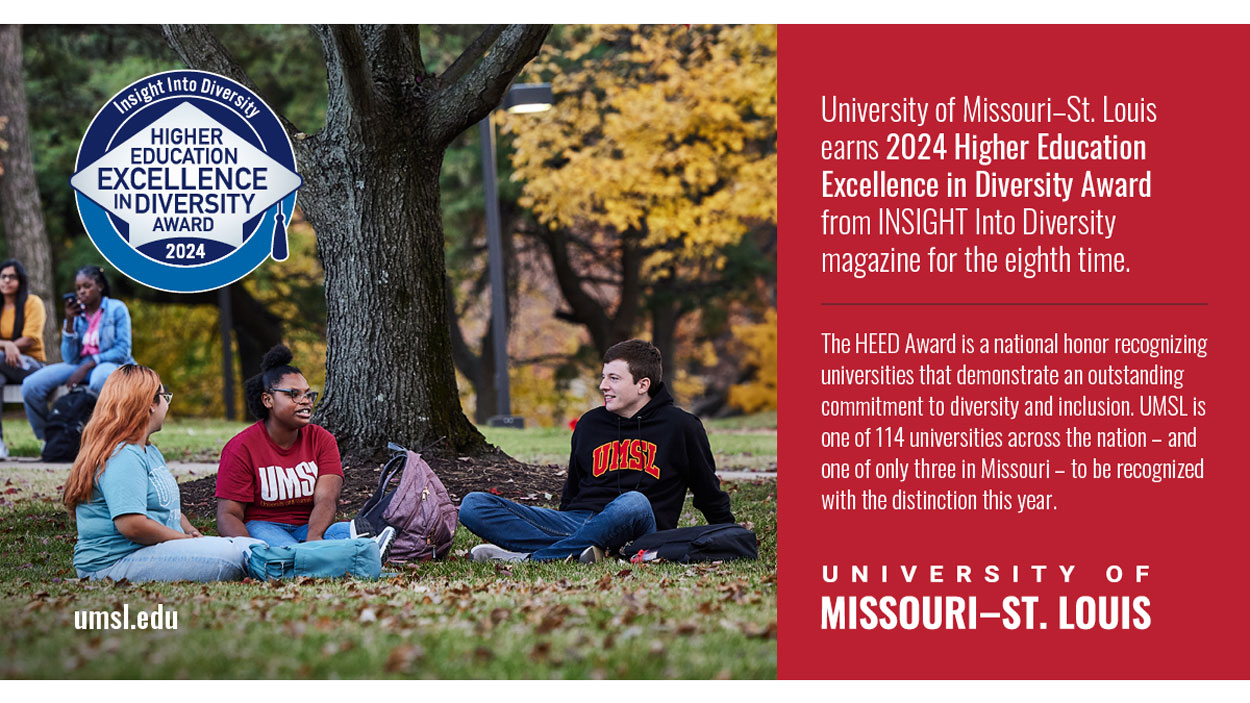
INSIGHT Into Diversity magazine named UMSL one of 114 recipients of the 2024 Higher Education Excellence in Diversity Award. It marked the eighth time UMSL received the recognition and the fifth year in a row.
The University of Missouri–St. Louis maintains a strong institutional commitment to fostering inclusion and has built a welcoming campus environment where everyone can feel appreciated and has a chance to thrive.
Community members also work intentionally beyond the borders of the campus to advance opportunity and promote inclusive prosperity throughout the St. Louis region and state of Missouri.
For the fifth consecutive year and eighth overall, INSIGHT Into Diversity magazine took note of those efforts and honored the university with its Higher Education Excellence in Diversity Award.
UMSL was one of 114 colleges and universities nationwide to receive the honor in 2024 after previously being recognized in 2013, 2014, 2015, 2020, 2021, 2022 and 2023. It was one of only three universities in Missouri included on this year’s list.
“This award shows that the continued commitment to the work that we do at the institution matters,” said Tanisha Stevens, UMSL’s vice chancellor for institutional effectiveness and compliance. “It matters to members of the campus community. It matters in regard to the different areas that we touch. The award is a demonstration that our work is intentional and not performative, and our inclusion efforts are in the fabric of who we are.”
Those efforts are woven throughout the university’s strategic plan, beginning with initiatives to elevate recruitment and retention of students as well as faculty.
The university, from its founding, has sought to expand access to high-quality higher education for students regardless of their background or socioeconomic status. It has been particularly successful serving nontraditional students, many of whom either chose to pursue higher education later in life or who have transferred from another institution. But UMSL has been intentional about trying to increase the number of first-time college students it serves and saw one of the largest freshman classes in the university’s history this fall.
It has also been taking steps to reach beyond the St. Louis region, including expanding the Gateway Scholarship Program to residents of all 50 states as well as Puerto Rico and the U.S. Virgin Islands so that new undergraduate students pursuing their first bachelor’s degree can receive the equivalent of UMSL’s in-state tuition rate. The university has also brought in a cohort of students from the Bahamas in the past two years as it strengthens its international recruiting.
UMSL’s Advanced Workforce Center, meanwhile, has established educational partnership agreements with organizations such as the St. Louis Metropolitan Police Department and World Wide Technology so that their employees can pursue the education and upskilling they need to advance in their careers.
The university has also been intentional about bolstering faculty recruiting and retention, building on efforts supported by a $1 million NSF ADVANCE grant to foster gender equity in STEM fields and social sciences through enhanced institutional structures, policies and processes.
“The ADVANCE grant group has really focused on looking at our institutional policies and how we do recruitment,” Stevens said. “We did a lot of work with training hiring committees, creating rubrics, creating those things that even when the person’s not there, the process was there. The ADVANCE grant also helped us develop some resources to help departments and expand the places where we recruit.”
Under the leadership of Chancellor Kristin Sobolik, UMSL has also shown a strong commitment to expanding opportunity for people regardless of background throughout the St. Louis region. It has played a leading role in the creation and ongoing work of the St. Louis Anchor Action Network, an alliance of higher education institutions, hospital systems, corporations and nonprofits with a shared commitment to advancing equity and removing barriers to economic opportunity. The network is particularly focused on bolstering hiring and procurement in 22 ZIP codes that have faced decades of disinvestment.
UMSL has been leading by example, spending more than $6.4 million contracting with vendors from within that focused geography in the 2023 calendar year – up from $3.7 million in 2022 – and also employing more than 650 people from those ZIP codes.
“The HEED Award process consists of a comprehensive and rigorous application that includes questions relating to the recruitment and retention of students and employees — and best practices for both — leadership support for diversity, campus culture and climate, supplier diversity, and many other aspects of campus diversity and inclusion,” said Lenore Pearlstein, publisher of INSIGHT Into Diversity magazine. “We take a detailed approach to reviewing each application in deciding who will be named a HEED Award recipient. Our standards are high, and we look for institutions where diversity and inclusion are woven into the work being done every day across their campus.”














